08.08.16
Posted in Europe, Patents, Rumour at 4:41 am by Dr. Roy Schestowitz
No transparency, no accountability (more greed and lawlessness)
 Summary: Rumours about the amount of money Benoît Battistelli gets paid to ruin the European Patent Office (EPO), which has become more secretive and accordingly reckless
Summary: Rumours about the amount of money Benoît Battistelli gets paid to ruin the European Patent Office (EPO), which has become more secretive and accordingly reckless
FOR a number of years now (not just months) people have wondered how much money Battistelli gets paid (money extracted from EPO budget without any proper oversight). Staff of the EPO does not trust Battistelli at all. Asking for transparency/details of Presidential salary should not be out of the ordinary as previous Presidents, a la Alison Brimelow (Battistelli’s predecessor at the Office), openly stated their salary and there was no confrontation about it. Battistelli is different because some say that Bergot, his friend’s wife (Elodie Bergot), increased his salary and/or bonus. We want to catch him in a lie right now, not because we have something against him personally but because the secrecy he brought to the EPO (definitely worse than in Brimelow’s days) hurts the credibility of the Office and damages — by extension — Europe’s reputation for accountability and relatively low corruption rates.
“Someone anonymous got told (a while back) that the salary was actually €42,000 a month (i.e. just over half a million Euros, a lot more than even national Presidents and EU heads receive), but that came through a friend via another friend, thus lacking any documentary evidence for it.”It is worth noting that Mr. Kongstad, Battistelli’s successor in the Council, knows Battistelli’s salary but cooperates in keeping the salary secret (as well as the contract which may include other forms of benefit/compensation). We are not going to go after Kongstad, however, because his role in this secrecy is at best intended to appease Battistelli’s will. Earlier this year we heard that Elodie Bergot gave Battistelli a raise (not years but months ago), so we assume her department too knows the salary but keeps quiet about it. Quite a few people out there know how much Battistelli gets paid, so why does he keep so quiet about it? Maybe because it contradicts what he said to the Dutch press?
Rumours about Battistelli’s salary/ies (contracts change over time) are out there in the wild. EPO workers speak about it, but few have actually seen a document confirming the hard facts. Someone anonymous got told (a while back) that the salary was actually €42,000 a month (i.e. just over half a million Euros, a lot more than even national Presidents and EU heads receive), but that came though a friend via another friend, thus lacking any documentary evidence for it. “The problem I have found,” told us this anonymous source, “is that almost everything I find out that I don’t actually see in a document has the risk of being false. That is what happens, I guess, when there is no transparency and people have to rely of rumors (very USSR). The most reliable rumors come from getting the IT people drunk in the EPO bar. They have access to everything.”
Half a million Euros annually (gross) contradicts other rumours we have come across, including some which say €1,000,000, €1.2m, or close to €1.5m.
What is the real salary? We may never know unless or until the contracts get leaked or Battistelli comes clean like his predecessor, Alison Brimelow. █
Permalink
 Send this to a friend
Send this to a friend
Posted in America, Courtroom, Patents at 3:43 am by Dr. Roy Schestowitz
Judge Raymond Chen has a track record of resisting § 101
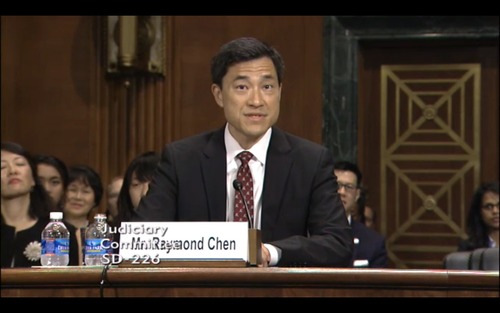
Summary: The perception of correlation between the Court of Appeals for the Federal Circuit (CAFC) judge that is assigned to a software patent/s case and the outcome of the case gives room for speculation
THERE is a lot to be celebrated now that the USPTO hardly accepts (abstract) software patent applications and even when it does, boards or courts will overrule it down the road. We fought for this for over a decade and after Alice it gradually became a reality, lowering the overall number of patent lawsuits and patent trolls, as expected. The EPO currently moves in the opposite direction, due to its misguided President. As Benjamin Henrion put it yesterday, in relation to the UPC with its bogus 'expert' teams, “software dev[elopment] does not need patents. UPC is a back door.”
The US Supreme Court has not dealt with the subject of software patenting for several years, but the Court of Appeals for the Federal Circuit (CAFC) deals with it all the time and usually, in about 90% of cases, accepts the Alice ruling and tosses away software patents. It is worth keeping track of who inside CAFC has a track record of not obeying Alice and in fact defying/rejecting it. This subject is hardly explored anywhere. In his latest article about CAFC, for example, Professor Crouch focuses on Halo, Pulse, and Seagate in relation to willful infringement claims, which is another subject altogether, namely damages.
“In order to keep software patents at bay (and away) we need to at least name the judges.”Daniel Cole, a patent attorney with Bold IP, worries about Alice and says that “Removing Section 101 Won’t be Enough” (to restore software patenting). This was published yesterday (as in every Sunday) in the pro-software patents site of Watchtroll. Well, software patent proponents want it all and they know how they can get it, if only opponents of software patents don’t remain vigilant. “If section 101 of the patent act,” he explains, “is removed the Supreme Court is extremely likely to simply continue to rely on those two precedents and continue to find abstract ideas and natural phenomena unpatentable. As the “broad language” of section 101 would also be removed the Supreme Court might even assume congress is giving it broad authority to enact further limitations on patentability.”
Brian Watkins, in the mean time tells me that “[i]n real life, on the other hand, the CAFC—especially J Chen—is halfway to overturning Alice.” He added [1, 2] “DDR Holdings: copying color code out of HTML file is patent-eligible. Bascom: running IPtables on remote host eligible. The two biggest steps on the road to overturning Alice and Bilski and returning to State Street Bank, both by Chen.”
The Enfish judgment, by contrast, he says is “[b]y Hughes w/ Moore, Taranto on panel.”
Citing Watchtroll, a vocal proponent of software patents, he says the article “lays out exactly how the trolls are overturning Alice step by step.”
This is worth noting perhaps, and better late than never, as we never really bothered checking who issued which CAFC ruling/s and what the patterns of outcomes were. In order to keep software patents at bay (and away) we need to at least name the judges. In the past, specifically inside CAFC, some judges were crooked and were working closely with outside interests. Randall Ray Rader is a recent example which we mentioned here many times before. Watchtroll already has a ‘thing’ for Mr. Chen (4 out of the top 6 search results are Watchtroll articles; see for example Google images search). █
Permalink
 Send this to a friend
Send this to a friend
08.06.16
Posted in Europe, Patents at 4:00 pm by Dr. Roy Schestowitz
Entering corridors of Power (for connections and influence)
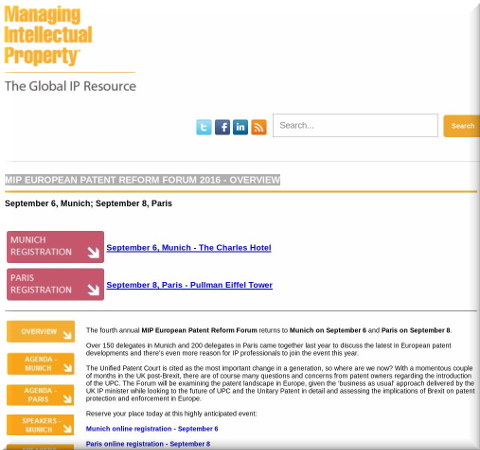
Summary: The latest example of what’s so utterly wrong with a bunch of conglomerates and their patent lawyers steering public policy and meeting in private to shape the law in their own favour
THE Web site Managing IP (MIP) is nowhere as bad as IAM, the EPO‘s mouthpiece of choice which sets up events for the EPO (funded in part by the EPO’s truly malicious PR firm).
“Their fear is probably an informed public which is abreast of their protectionist schemes (like ISDS).”Patent ‘elites’ must heed the warning of populist rage against injustices like the UPC, but they don’t. They just try to keep things more of less secret or in the shadows. Their fear is probably an informed public which is abreast of their protectionist schemes (like ISDS).
Based on IP Kat‘s “Friday Fun” [sic], MIP sets up a dubious event (covering “UPC and Brexit”). It is encouraging the attendance of patent maximalists and, as usual, leaving critical voices shut out through prohibitive costs and no chance of a speaking position, impact etc. Here is the direct link and here is how IP Kat put it: “MIP European Patent Reform Forum. Managing IP’s upcoming European Patent Reform Forum will be taking place in Munich on September 6 and in Paris on September 8. There will be plenty to discuss this year, and with topics like the UPC and Brexit on the table the forum and dialogue promise to be exceptionally interesting. The programmes also offer presentations on FRAND terms, enforcement and evidence of infringement from an impressive selection of speakers, so this event is really not to be missed.
“In-house, patent and IP counsel can attend the Forum for free, and other private practice IPKat readers can attend for a discounted price of €820 + VAT (usually €1095). To register for Munich, it’s here – for Paris, here, or you can email or contact Managing IP.”
“It’s the kind of congregation that’s typically encouraging collusion and/or conspiracy against public interests and with fees so high (over a thousand pounds for just a little chair… for one day) don’t expect public interest groups to attend.”“Why is it that,” asked one person, an attendant “who works in-house in a multi-billion dollar global company, get to attend for free?” Well, Team UPC and others inside the patent microcosm wish to be of influence for big businesses and for big money (they are, after all, their biggest clients). These events are, in practice, primarily about making connections in corridors and behind closed doors. The fee lets one brush shoulders and make contracts/contacts with potential clients, partners, officials etc. That’s just how lobbying works, too. It’s the kind of congregation that’s typically encouraging collusion and/or conspiracy against public interests and with fees so high (over a thousand pounds for just a little chair… for one day) don’t expect public interest groups to attend. It’s worth noting that FRAND, which is against FOSS, will be discussed at the event. Will there be any opponents there? Opponents of FRAND? Unlikely. It’s an echo chamber.
Having mentioned Lucy Neville-Rolfe just a few days ago, it’s worth noting that the above from IP Kat takes note of her too. She is considered the person to influence (or lobby) right now.
MIP is not an evil site, but when it comes to business models (like firm endorsements and recommendations or even lobbying opportunities) it needs to be careful as it jeopardises its integrity. █
Permalink
 Send this to a friend
Send this to a friend
Posted in Europe, Patents at 3:27 pm by Dr. Roy Schestowitz
Attacks on whistleblowers and/or on staff unions inside international organisations is not just an EPO thing
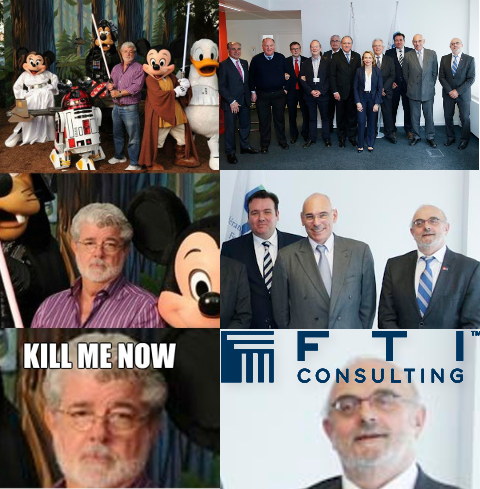
Summary: The actions of Francis Gurry discredit the UN and do a disservice to everyone in the same way that Battistelli’s terrible actions discredit Europe and threaten Europe’s industry
THE EPO‘s members of staff are having breaks this summer (there’s no shortage of those), so SUEPO has not been saying much in nearly a month. It would be hard to organise protests right now. Those who should be held accountable are probably not even at the Office.
This morning SUEPO mentioned USF [1, 2, 3] (yet again), having also caught up with AMBA’s response to Battistelli's persistent attacks, culminating in ‘exile’ (see this leaked message).
“Those who should be held accountable are probably not even at the Office.”No doubt we’ll return to covering the EPO affairs pretty soon (there’s a lot more in store). In the mean time, here is the bit about WIPO, whose staff's situation is in many ways similar to that of the EPO's staff (including Battistelli-Gurry overlaps).
“The USF published an article entitled “WIPO – Stop union-busting and stop retaliation against whistleblowers”,” SUEPO wrote today (there is also a French version). To quote the English-speaking page:
In September 2014 the Director General of the World Intellectual Property Organization (WIPO), Francis Gurry, fired WIPO Staff Council President, Moncef Kateb, as he was about to reveal damaging information about fraud, wrongdoing, mismanagement and theft of staff DNA. Now Gurry is trying to close down the Staff Council and replace it with a new compliant, management-friendly model.
Gurry decided to set up his own WIPO Staff Council and is currently preparing illegal elections in order to dislodge the current duly elected Staff Council which is too critical for his liking. This will leave WIPO staff deprived of the last independent voice that is prepared to expose bad practices and abuse of power in this United Nations Specialized Agency.
It is a desperate move by Gurry at a time when attempts are being made to cover up and suppress an investigation report, apparently containing adverse findings on allegations made against him. It follows a public hearing at the US Congress at which he was compared to Sepp Blatter, the former President of FIFA, and a letter from the heads of several bipartisan sub-committees demanding his dismissal.
We need your support.
Please tell Gurry to stop retaliation against whistleblowers and the legally elected Staff Council. Please tell the WIPO Member States to call for Gurry’s resignation. The credibility of the Organization, its Member States and the entire UN system is at stake.
So even Gurry was “compared to Sepp Blatter, the former President of FIFA,” making Battistelli a little jealous perhaps (now they have competition, after Gurry beat Battistelli to the WIPO position). Who will be the first to end up like Blatter? Will it be Gurry or Battistelli? Will it eventually be both? █
Permalink
 Send this to a friend
Send this to a friend
Posted in America, Apple, Patents, Samsung at 2:55 pm by Dr. Roy Schestowitz
And why EPO policies under Battistelli will emulate the worst aspects of the USPTO
 Summary: The Government Accountability Office (GAO) explains that decline in patent quality in the US is responsible for a hostile environment which fosters litigation rather than innovation; BlackBerry the latest example of patent assertion firms (trolls) which would make phones ‘dumber’ (features like a mechanical keyboard removed or never added in the first place)
Summary: The Government Accountability Office (GAO) explains that decline in patent quality in the US is responsible for a hostile environment which fosters litigation rather than innovation; BlackBerry the latest example of patent assertion firms (trolls) which would make phones ‘dumber’ (features like a mechanical keyboard removed or never added in the first place)
LAST month we wrote about GAO in relation to the EPO [1, 2], demonstrating that the US patent system has gone out of touch and increasingly disconnected from the raison d’être of patents.
A good but somewhat belated article from TechDirt covers this topic, citing the Government Accountability Office for support:
This shouldn’t be a surprise. All the way back in 2004, in Adam Jaffe’s and Josh Lerner’s excellent book about our dysfunctional patent system, Innovation and Its Discontents, one of the key problems they outlined with the system was the fact that there was strong incentives for patent examiners at the US Patent Office to approve shit patents. That’s because they were rewarded for how “productive” they were in terms of how many patent applications they completed processing. Now, you might think that shouldn’t encourage approvals — except that there’s no such thing as a true “final rejection” from the patent office (they have something called a final rejection, but it’s not — applicants can just make some changes and try again… forever). So rejecting a patent, inevitably, harms your productivity rates as an examiner. Approving a patent gets it off your plate and is considered “done.” Rejecting it means having to spend many more hours on that same patent when the inventor comes back to get another chance.
After Jaffe and Lerner made that criticism clear, it seemed like the Patent Office started to take the issue to heart and they actually started changing some of how examiners were rated. And, for a few years, it seemed like things were heading in the right direction. But then, once David Kappos took over, he noticed that a lot of patent holders were complaining that it took too long to get patents approved. Apparently ignoring all of the evidence that pushing examiners to review patents quickly ends up in disaster, Kappos put back in place an incentive structure to encourage examiners to approve more patents. He kept focusing on the need to get through the backlog and speed up the application process, rather than recognizing what a disaster it would be. Of course, some of us predicted it and were mocked in the comments by patent lawyers who insisted we were crazy to suggest that the USPTO would lower its standards.
Of course, an academic study a few years ago found that was absolutely happening and now, to make the point even clearer, the Government Accountability Office, which tends to do really fantastic work, has written a report that agrees. It blames the Patent Office’s focus on rapidly approving patents for the flood of low quality patents and the resulting patent trolling epidemic…
Noting that last part about a “trolling epidemic” (to the point where 90% of all technology lawsuits are filed by trolls), we wish to highlight the correlation between abstract software patents and software patent trolls. Since half a decade ago we have highlighted the strong correlation between patent trolls and software patents, so had the USPTO stopped granting patents on software, a lot of this “trolling epidemic” would go away almost entirely. It would not be a viable business model for reasons we explained here repeatedly over the years. Given an extraordinary number of patents granted to BlackBerry (far too many to be deemed high quality), this is relevant to the past week’s news. BlackBerry, which is rapidly becoming a troll (or PAE) down in Texas [1, 2], has generated more and more headlines in recent days, e.g. [1, 2, 3, 4, 5, 6]. “Blackberry is now a troll,” wrote Benjamin Henrion (FFII). “Too bad NTP did not kill them 10 years ago.”
BlackBerry is one among many such companies. Apple, for example, having totally lost the plot to Android in India (where Android is now estimated to have 97% of the market; see daily links for details), is suing endlessly. Is there another Apple-Samsung patent war in the making? As one site notes right now: “Samsung filed a patent for a smartwatch with a detachable strap. Detachable band straps are already there. So, what’s the big deal? Their new smartwatch looks like the Apple’s iWatch. Now, that’s a big deal.
“Samsung is not eyeing another patent war with Apple, hopefully, they aren’t. Because, the last time when they did it, they had to suffer for it. A California court had ordered Samsung to pay 548 million dollars.”
“It would mean that phones must have features and parts removed from them.”Apple has been suing Android OEMs for more than 6 years, starting with HTC. We expect BlackBerry to do the same thing pretty soon. Does that mean more innovation? Quite the contrary. It would mean that phones must have features and parts removed from them. █
Permalink
 Send this to a friend
Send this to a friend
08.05.16
Posted in America, Deception, Patents at 3:33 pm by Dr. Roy Schestowitz
Still championing patent quality after a dark age of rubberstamping under David Kappos
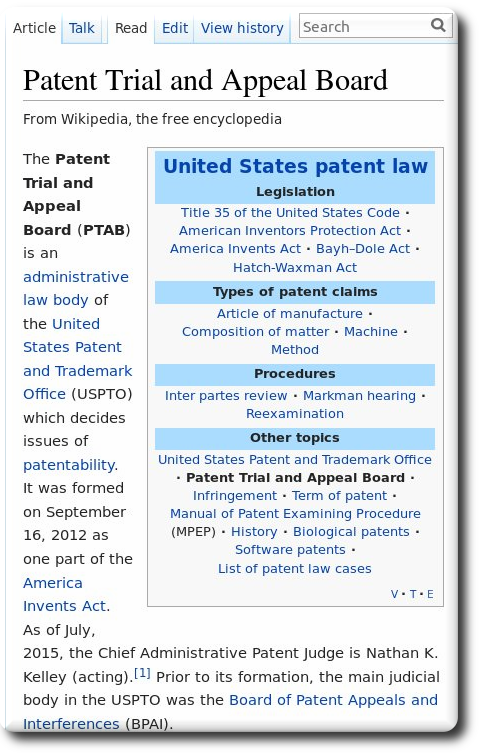
Summary: Hope for the US patent system as some of the most controversial abstract patents are declared invalid and thrown aside
THE ROLE of the PTAB, the scientific collective responsible for abolishing a lot of software patents by proactive action, is increasing. Things are changing very rapidly, but corporate media isn’t reporting (or misreporting) on it. This is good news for opponents of software patents anywhere in the world.
PTAB has enemies. Its enemies are people who profit from patents on software, notably patent lawyers. They are currently discrediting PTAB using the term/notion of “reverse patent trolls” (invalidating bad patents is trolling?!). MIP has had a decent series about PTAB this past week. The earlier part speaks of “authors of a new white paper [who] believe that almost 75% of pharmaceutical patent settlements at the Patent Trial and Appeal Board meet the criterion for inferring a strong likelihood of reverse payment settlement. The paper also suggests a rule to deter attempts to exploit the Board as a holdup device as well as discussing reverse patent trolls” (meaningful and inappropriate term).
“Things are changing very rapidly, but corporate media isn’t reporting (or misreporting) on it.”Lobbyist for software patents, David Kappos, also pushed out a so-called ‘white paper’ without disclosing who was paying him for all that (it’s pretty ugly and it definitely discredits the USPTO where he was previously a Director, the highest position and equivalent of President at the EPO).
Another installment from MIP then gave a detailed breakdown of law firms that profit from all this chaos of poor patent examination at the Patent Office. We recognise many of these firms. MIP said that “Sterne Kessler has become the first law firm to handle more than 500 AIA proceedings, with a particularly strong showing representing defendants. Fish & Richardson is the top law firm for challengers at the PTAB, breaking the 300 petition mark” (Fish & Richardson was mentioned here many times before.
The part which we didn’t quite appreciate was the one where Michael Loney of MIP was cherry-picking like climate change denialists, making it appear like PTAB was on the decline with the headline “July CBM petition filing slumps to lowest level since February 2013″ (skip to third paragraph for context).
PTAB staff may be taking their summer’s break and as Loney later noted, “PTAB Monthly Data and Analysis: July was the second-busiest month of 2016 for petition filing, but covered business method petitions fell to the lowest level since February 2013. Recent decisions from the Board include cancelling claims on a patent that had been used to sue more than 250 defendants” (CBMs are part of a broader picture).
“This is good news for opponents of software patents anywhere in the world.”To put things in perspective: “The month seems particularly strong when compared with that time of year in previous years. July in 2015 and 2014 was a relatively quiet month with both June and August of those years having at least 50 more petitions filed than the July figure.” Another article took note of 11% litigation decline last month, showing that the system was gradually correcting itself. To quote, “407 cases were filed in US district courts in July, with two new plaintiffs leading the way and entities such as Shipping and Transit, Uniloc, Sportbrain and Guyzar adding to their 2016 totals” (these are mostly patent trolls).
MIP looked more closely at one particular case and said: “The Patent Trial and Appeal Board (PTAB) has invalidated all the claims of a patent owned by storage software company Boxbee in a post-grant review (PGR) proceeding brought by Netsirv and Local Motion. This is the third final written decision in a PGR, all of which have resulted in patents being invalidated.”
It is hardly surprising. PTAB typically demolishes the patents it looks into, leaving patent lawyers rather scared and bashful (in the face of their clients). A software patents lobbying site, for example, got so upset at PTAB that Gene, its founder, tried cursing at it (“impotence”). Here is a new take about PTAB in the “Post-Alice World”. It says: “Only 16% of the Board’s eligibility decisions fully reversed the eligibility rejections, and none of the other 84% of the applications have been allowed despite the effort and the expense of the appeal.”
“PTAB typically demolishes the patents it looks into, leaving patent lawyers rather scared and bashful (in the face of their clients).”Yes, so what? They’re obviously trying to discredit PTAB, a cornerstone of AIA. Here is one patent attorney leaning on Bascom, in spite of the case's old age (they’ll refer to it forever because they’re running low on supportive cases), saying it “turns this on its head by holding that the Patentee must proffer prior art to show 101 validity. Alice shifts burden of proof.” A sponsored “REPORT” (i.e. paid marketing) from IAM repeats this same talking point. They just can’t help it, can they? PTAB combined with Alice is a nightmare to them and all they can do it ridicule Justices, call PTAB “impotent” (low blow), and mislead clients into believing that nothing has changed.
“Lawyers are liars,” my wife told me years ago. She had heard that saying quite a lot. It certainly is the case when it comes to a lot of patent lawyers, at least those who are pushing their agenda into articles (self promotion disguised as ‘analyses’). █
Permalink
 Send this to a friend
Send this to a friend
Posted in America, Patents at 8:52 am by Dr. Roy Schestowitz
…Not even if the algorithms are run on some “general purpose computer” (whatever that means!)

Summary: Software patents and lawyers who depend on them are running out of time and running low on spin/cherry-picking/excuses
YESTERDAY we wrote about video streaming patents and a notorious podcasting patent getting invalidated, with admission from the USPTO that it granted in error (prior art, not just Alice). Some software patenting proponents caught up with it and posted a link to the full decision: “Dist. Of DE Kills 2 Video Streaming Patents with Alice/ 101: http://assets.law360news.com/0824000/824998/04313306922.pdf …”
The word “kills” is intended to give this a negative connotation, just like “attacks” and “death squad” (same person uses these words a lot).
This wasn’t a CAFC decision and that’s actually noteworthy because nowadays the Court of Appeals for the Federal Circuit (CAFC) is a lot more likely to invalidate/reject software patents based on Alice. Speaking of CAFC, a new article by Dennis Crouch speaks of scope limitation induced by “consisting of” inside patents. To quote:
Although our attention over the past few years has focused more on eligibility and definiteness issues, claim construction continues to befuddle the courts. In MultiLayer Stretch Cling Film v. Berry Plastics (Fed. Cir. 2016), the Federal Circuit has offered a split interpretation of the patent’s Markush group claim element.
The asserted cling-film claim requires “five identifiable inner layers with each layer being selected from the group consisting of LLDPE, VLDPE, ULDPE, and mLLDPE resins.”
So here we have another example of tightening patent scope, other than what’s related to Alice.
Speaking of Alice and CAFC, Troutman Sanders LLP wrote in the software patenting proponents’ site earlier today, noting that according to CAFC, “Software means plus function claims Indefinite for failure to disclose algorithm,” or in other words software patents are not “function [if you] then disclose a “general purpose computer” as the structure performing that function.”
This is noteworthy because efforts to pass/sneak in software patents in India, Europe and New Zealand have relied on attempts to ascribe physical properties to software by stating in the patent application that it runs on some machine (typically just some ordinary off-the-shelf PC or server). To quote the funnier part from the above: “The Court also affirmed that the this means-plus-function term was indefinite. In the case of computer-implemented functions, the specification must disclose an algorithm for performing the claimed function. The patents-in-suit did not disclose an operative algorithm for the claimed “symbol generator.” The function of generating symbols must be performed by some component of the patents, but the patents did not describe this component.”
So the patent/s did not even describe an algorithm, let alone pseudo-code!
It definitely looks as though patent lawyers are growing nervous, seeing year after year how more and more abstract patents get thrown down the toilet/wastebasket, essentially devaluing the remainder (those not tested in the court or in PTAB, which we shall write about next). █
Permalink
 Send this to a friend
Send this to a friend
Posted in America, Patents at 8:27 am by Dr. Roy Schestowitz
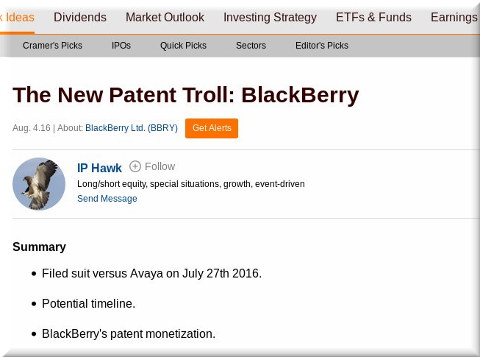
Summary: Transition from production to so-called ‘licensing’ (i.e. patent shakedown), as Microsoft has been doing against Android/Linux/ChromeOS, compared publicly to patent trolling
BlackBerry is gradually becoming more of a patent troll. We warned about this several years ago and now it’s officially happening. We wrote about this earlier in the day yesterday and shortly afterwards we found the article “The New Patent Troll: BlackBerry” (via The IP Hawk, who actually wrote it).
What’s nice to see here is that our prediction was correct. It’s sad to see once-practicing companies resorting to these tactics because their sales or market share are minuscule and products not compelling/competitive anymore.
Yesterday we mentioned Forbes suggesting that it’s possible Nintendo can come under many software patent lawsuits. Some in the patent-centric press are now wondering aloud if Nintendo will use patents for revenue, as means of deriving money from Pokemon GO:
With all due respect, this blogger remains skeptical about these several expressions of seemingly limitless optimism for Nintendo’s IP potential on mobile. He can never forget the valuation of nearly $2.5 billion dollars or more that was coming from the investment community in 2011 regarding the Kodak patent portfolio, here. When the dust settled in the court-managed proceedings, the patent portfolio was sold for only approximately $500 million dollars, here. This blogger has not deviated from the sense that the initial estimate was as much (or more) about hope, prayer, and investment house spin as an indication of genuine market value.
For that reason, when Mr. Fischer suggests that the company can unlock IP licensing revenues—of company patents– ranging from $290 million to $570 million, this blogger needs to ask: What is there in the company’s patent portfolio (separate apart from licensing of the character rights), that supports such an amount? Indeed, how is the value of this estimate range reached?
Well, software patents haven’t a foothold anymore, so suggesting that companies will shell out hundreds of millions of dollars for these is totally disconnected from reality. As for BlackBerry, it is suing in Texas now, perhaps hoping that this defunct and bias ‘legal’ system would favour its patents (which to be fair include quite a few hardware patents, not just software patents). █
Permalink
 Send this to a friend
Send this to a friend
« Previous Page — « Previous entries « Previous Page · Next Page » Next entries » — Next Page »
 Summary: Rumours about the amount of money Benoît Battistelli gets paid to ruin the European Patent Office (EPO), which has become more secretive and accordingly reckless
Summary: Rumours about the amount of money Benoît Battistelli gets paid to ruin the European Patent Office (EPO), which has become more secretive and accordingly reckless



 Summary: The Government Accountability Office (GAO) explains that decline in patent quality in the US is responsible for a hostile environment which fosters litigation rather than innovation; BlackBerry the latest example of patent assertion firms (trolls) which would make phones ‘dumber’ (features like a mechanical keyboard removed or never added in the first place)
Summary: The Government Accountability Office (GAO) explains that decline in patent quality in the US is responsible for a hostile environment which fosters litigation rather than innovation; BlackBerry the latest example of patent assertion firms (trolls) which would make phones ‘dumber’ (features like a mechanical keyboard removed or never added in the first place)


















 Content is available under CC-BY-SA
Content is available under CC-BY-SA